Flash Survey: 70% of Israelis Support the Decision to Attack Iran | Segmentation Shows Strong Support Among Jewish Israelis (82%) While Most Arab Israelis Oppose the Operation (65%)
82% of the Jewish public supports Israel’s attack on Iran and the timing of the attack. 65% of the Arab public opposes both the attack and the chosen timing. Some two-thirds of the Jewish public believe that Prime Minister Netanyahu’s motives for launching an attack at this time were mainly objective and security-related. Two-thirds of the Arab public think that his motives were mainly subjective and political.

People take cover inside a cable car tunnel following a missile attack from Iran on Israel, at Haifa | Photo by REUTERS
Methodology
The survey was conducted by the Viterbi Family Center for Public Opinion and Policy Research at the Israel Democracy Institute between June 15–17, 2025. It was based on a representative sample of the population in Israel aged 18 and above, comprising 594 Jewish interviewees and 143 Arab interviewees.
Main Findings
- A large majority of the Jewish public support Israel’s attack on Iran and the timing of the attack. Most of the Arab public oppose both the attack and the chosen timing.
- The majority of Jews have a high estimation of the resilience of the Israeli public. This notwithstanding, they are worried about their physical safety and the safety of their families. A very large share of Arabs are also worried about their safety, however only a small share have a positive view of the resilience of the Israeli public.
- As of today, most Israeli Jews believe that Israel’s security is a main consideration for President Trump—a sharp rise compared to last month when this share was lower against the backdrop of President Trump's talks in Riad and the US nuclear negotiations with Iran. The share of Arabs who hold the same view is declining, though it is nonetheless a plurality that holds this opinion.
- Some two-thirds of the public believe that now was right to launch the attack on Iran even without an explicitly stated intention on the part of the United States to participate in efforts to destroy Iran’s nuclear capabilities. In the past, the majority held the opposite opinion – that such an attack should be implemented in partnership with the US.
- Some two-thirds of the Jewish public believe that Prime Minister Netanyahu’s motives for launching an attack at this time were mainly objective and security-related. Two-thirds of the Arab public think that his motives were mainly subjective and political.
- A small majority of the Jewish Israeli public think that, in light of the security situation, it would be right to form a broad national unity government. Fewer than one third of Arabs see it this way.
- A very large majority of the Jewish and Arab public find the IDF Home Front Command’s instructions to be clear.
- Around two-thirds of the Jewish and Arab public estimate that the war will end within a month or less.
- Some three-quarters of the Jewish public think that the suffering of the civilian population in Iran should not be taken into account when planning the continuation of the war, while only a quarter of Arabs concur.
Over 80% of the Jewish public, including a majority in all three political camps, support Israel’s attack on Iran. Similarly, there is strong support for the timing of the attack, despite the continuing war in Gaza and the plight of the hostages, with two-thirds of the Jewish public saying that the timing was appropriate. On the Left however, only a minority think that the timing is suitable. Among Arabs, a large majority oppose both the attack and its timing.
Do you support or oppose Israel’s decision to launch an attack on Iran? (%)
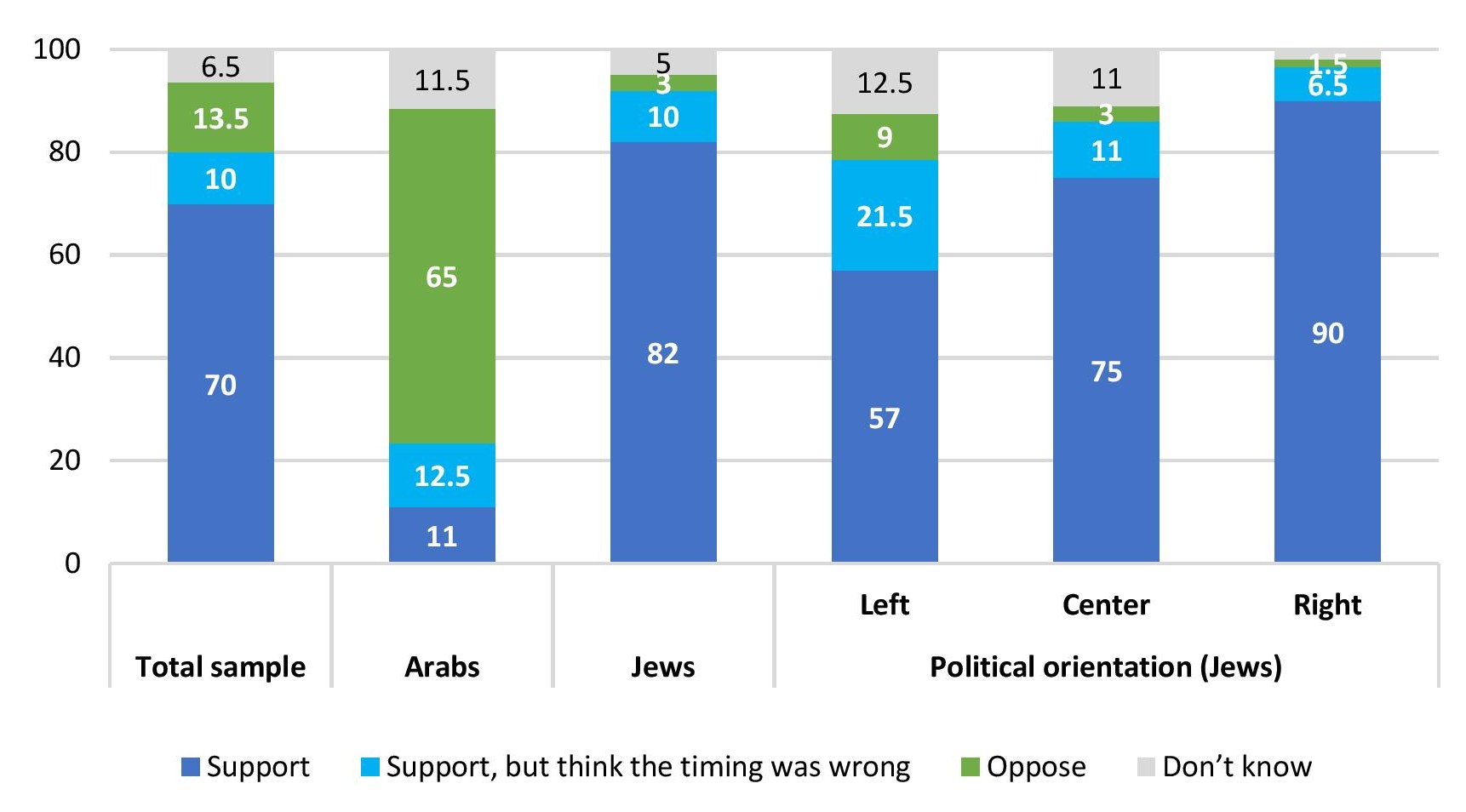
What do you think about the timing of the attack (with the ongoing war in Gaza, and while there are still hostages being held by Hamas)? (%)
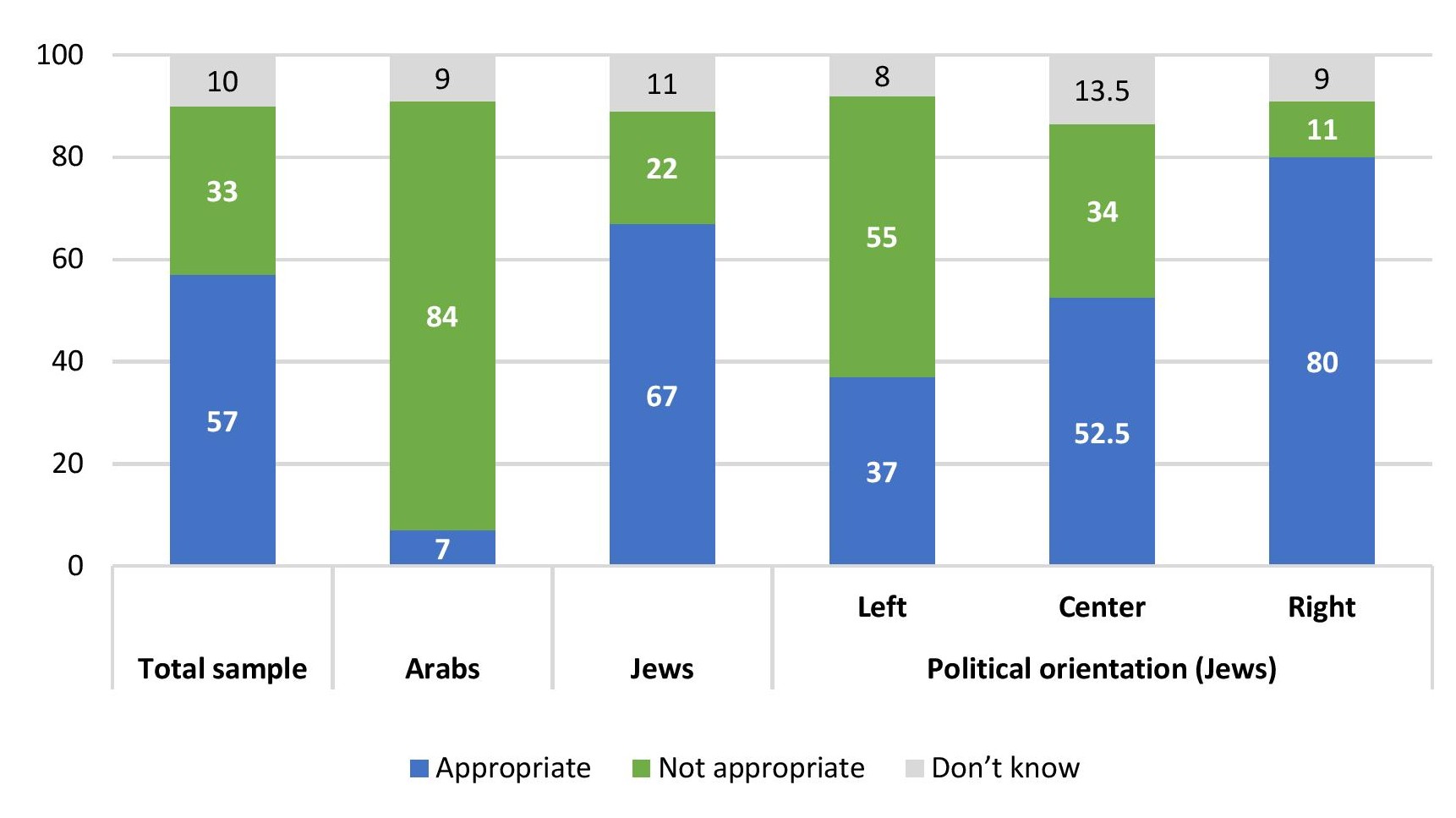
A very large majority of the Jewish sample, and of each of the three political camps, have a high estimation of the public’s resilience and fortitude so far. This assessment notwithstanding, in the context of the missile attacks from Iran, around two-thirds of Jews are, understandably, concerned about their physical safety and the safety of their families in the shadow of the current war.
Among Arabs, the picture is very different: A very large share are worried about their physical safety and the safety of their families. However, in contrast to the Jewish respondents, only around a third gave a favorable assessment of the resilience of the Israeli public.
How would you characterize the level of resilience and fortitude of the Israeli public during the war until now? (%)
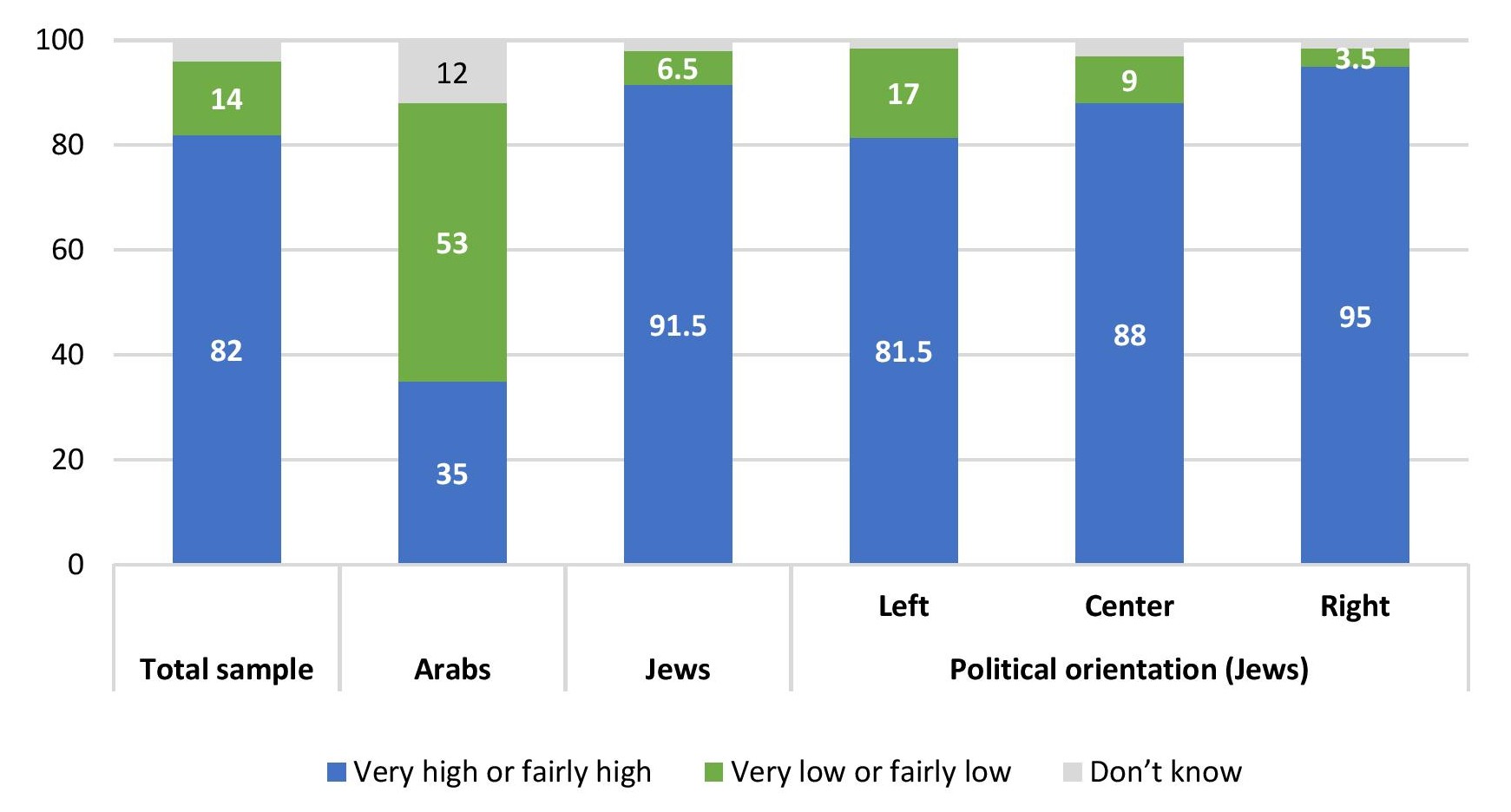
On a personal level, how worried or not worried are you about your own physical safety and the safety of your family in the foreseeable future? (%)
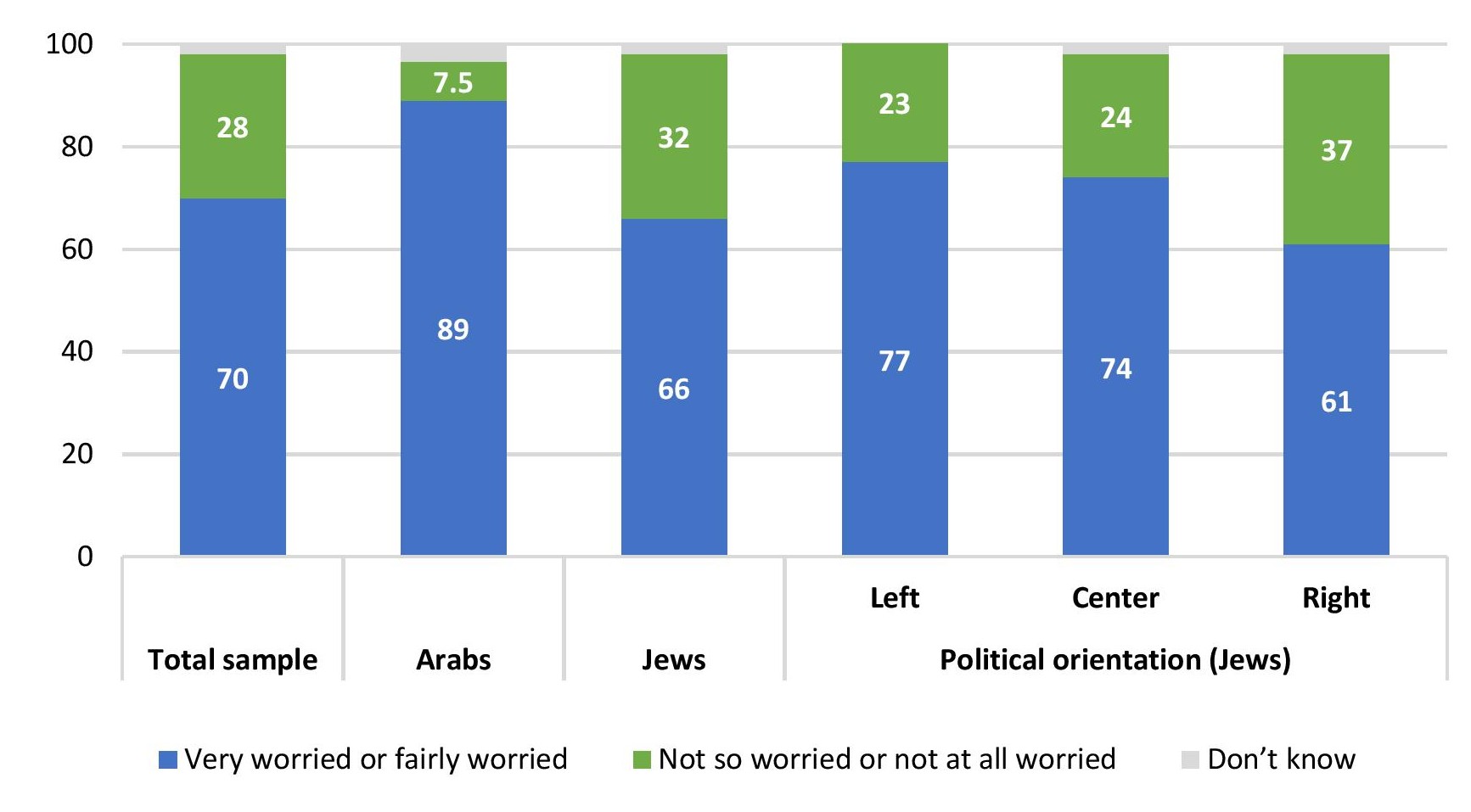
As of today, and similarly to our measurements in late 2024 and early 2025, most of the Jewish public thinks that Israel’s security is one of President Trump’s central considerations. This is the majority view on the Right and in the Center, while the majority of those on the Left take the opposite view. The share of Jews who think it is indeed a central consideration for Trump has returned to levels from early this year—this followed a lower level last month, in the context of Trump’s’ visit to Riad and the nuclear negotiations with Iran during which Jewish Israelis lost some of their confidence in his commitment to Israel’s security.
Among Arabs, the trend is the opposite: While two-thirds thought that Israel’s security was a central consideration for Trump last month, only half think so now, as thus far the US has not taken an active part in the fighting.
In your opinion, to what extent is Israel’s security one of President Trump’s central considerations? (%)
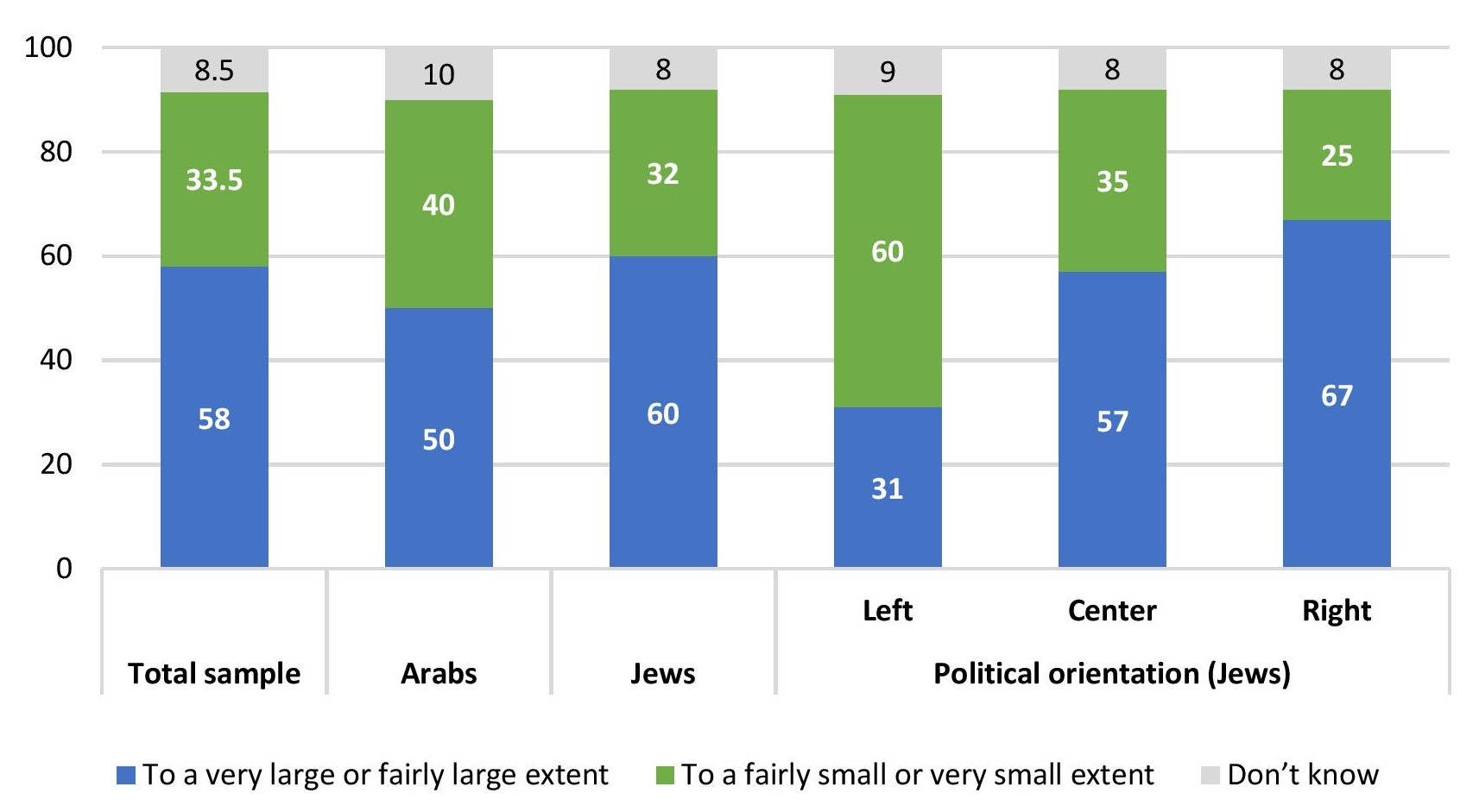
Think that, to a large extent, Israel’s security is one of President Trump’s central considerations (%)
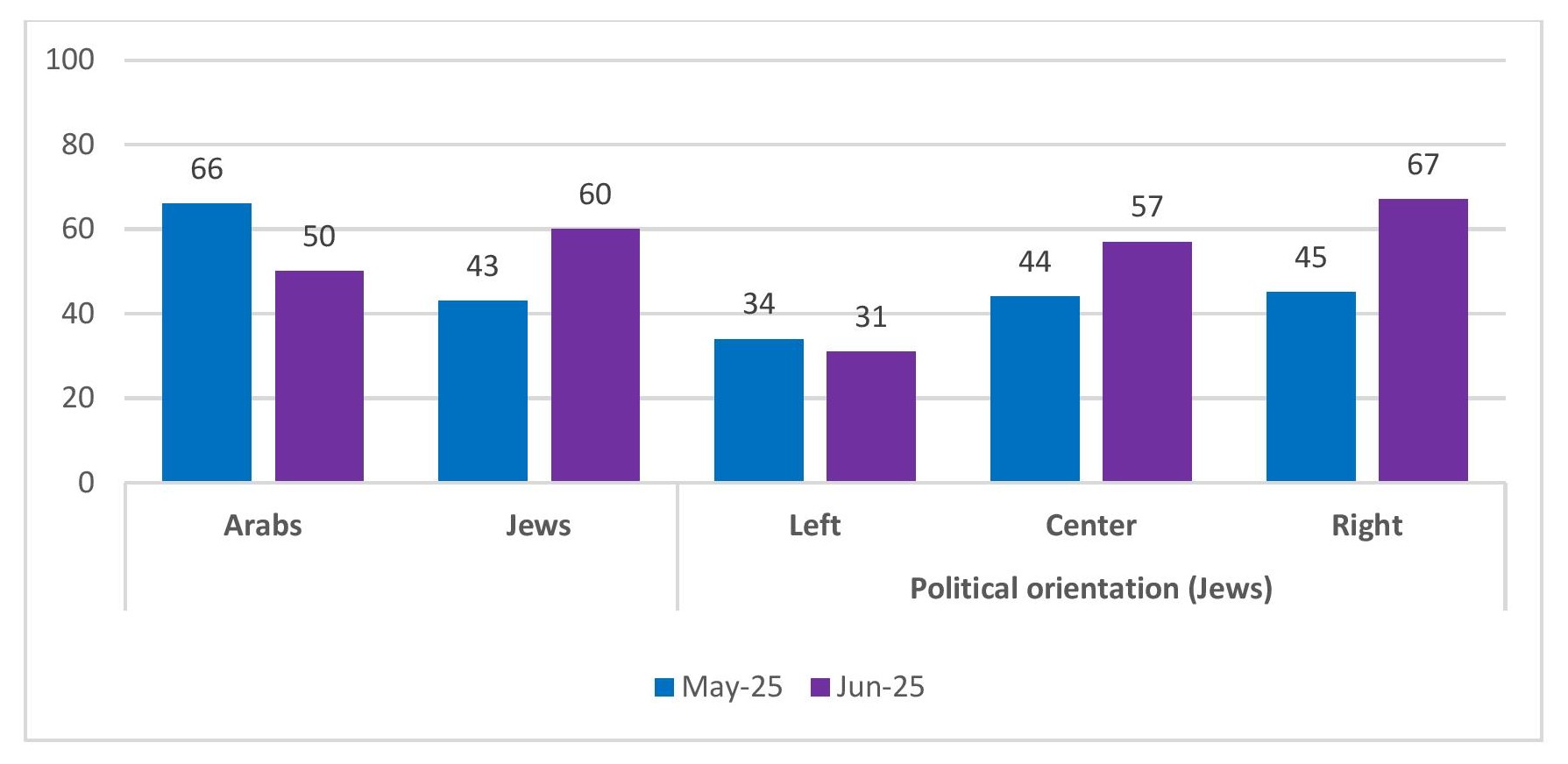
A majority of Jews overall, and a majority of those on the Right and in the Center (though not on the Left), think it was. Among Arabs, around half think that this was not the right decision. It is worth mentioning that in the past, most Jewish Israelis did not think that Israel should strike Iran without the US backing and even participation.
It has been claimed that Iran’s nuclear capabilities cannot be destroyed without help from the United States. Assuming this is true, was it right or not right to launch the attack on Iran having only informed the Americans, but without having secured their express intention to participate in these efforts? (%)
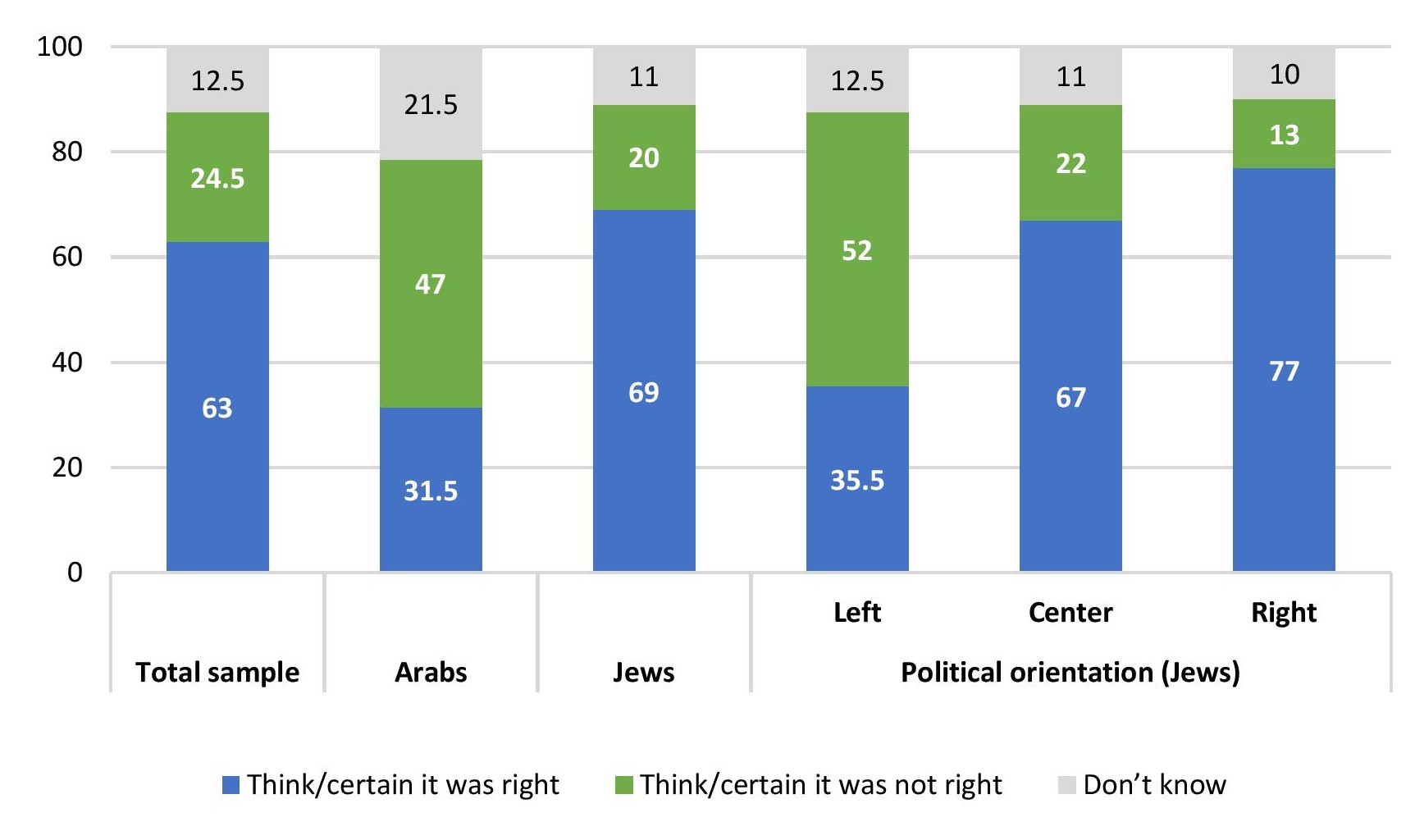
Two-thirds of the Jewish public believe that Prime Minister Netanyahu’s considerations were largely objective and security-related. This is the view of a large majority on the Right, and of around half of those in the Center. On the Left, about half think that Netanyahu’s motives were mainly subjective and political—as do more than two-thirds of the Arab public.
Which considerations were most important in Prime Minister Netanyahu’s decision to launch an attack on Iran at the current time? (%)
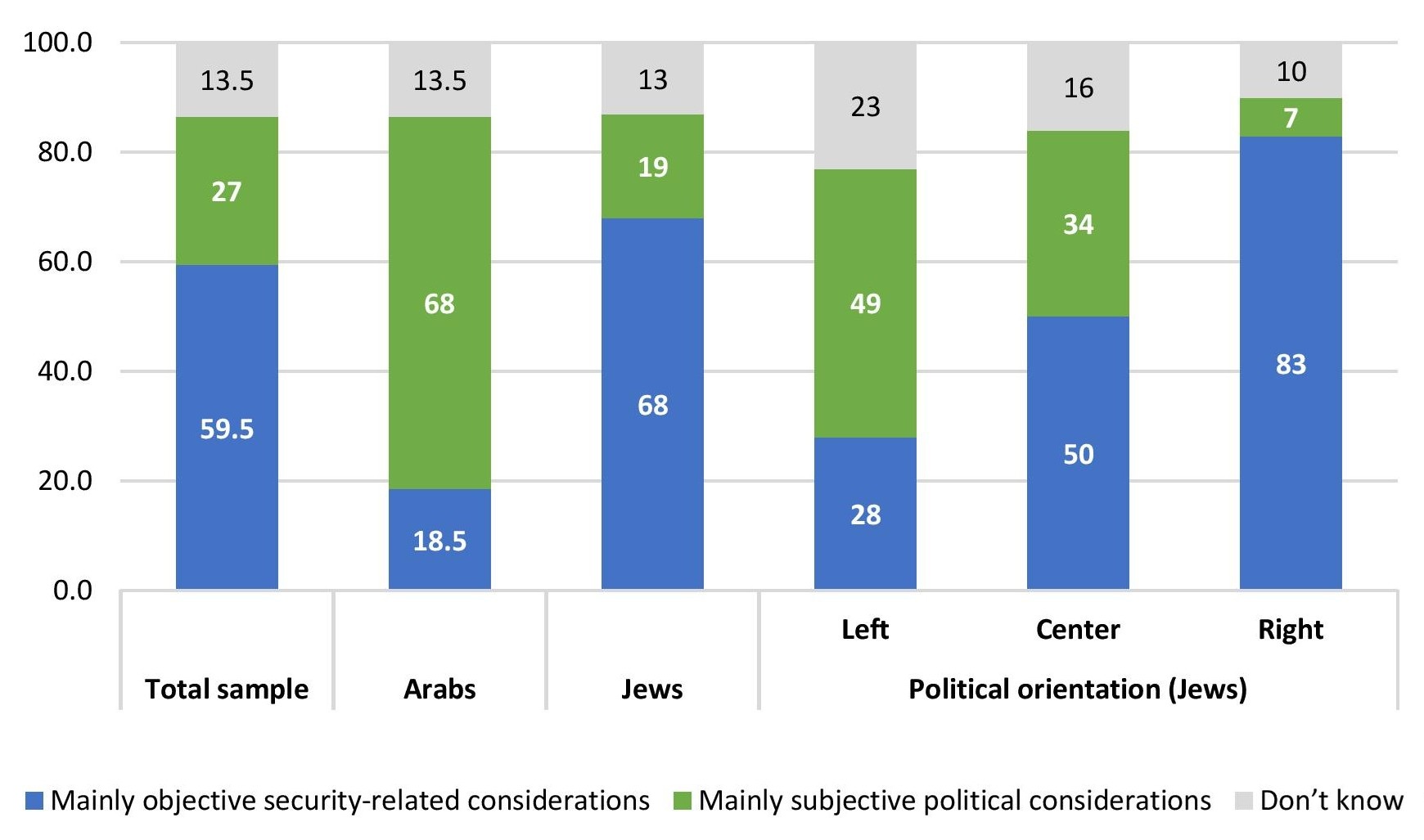
Around half the Jewish respondents think that, given the current security situation, it would be right to establish a broad national unity government. The share of respondents who take this view is largest in the Center and smallest on the Left. The Arab public is undecided on this issue, with almost one-third opting for the "don't know" response.
In your opinion, given the current security situation (war in Gaza, war with Iran, attacks by the Houthis), would it be right or not right to establish a broad national unity government? (%)
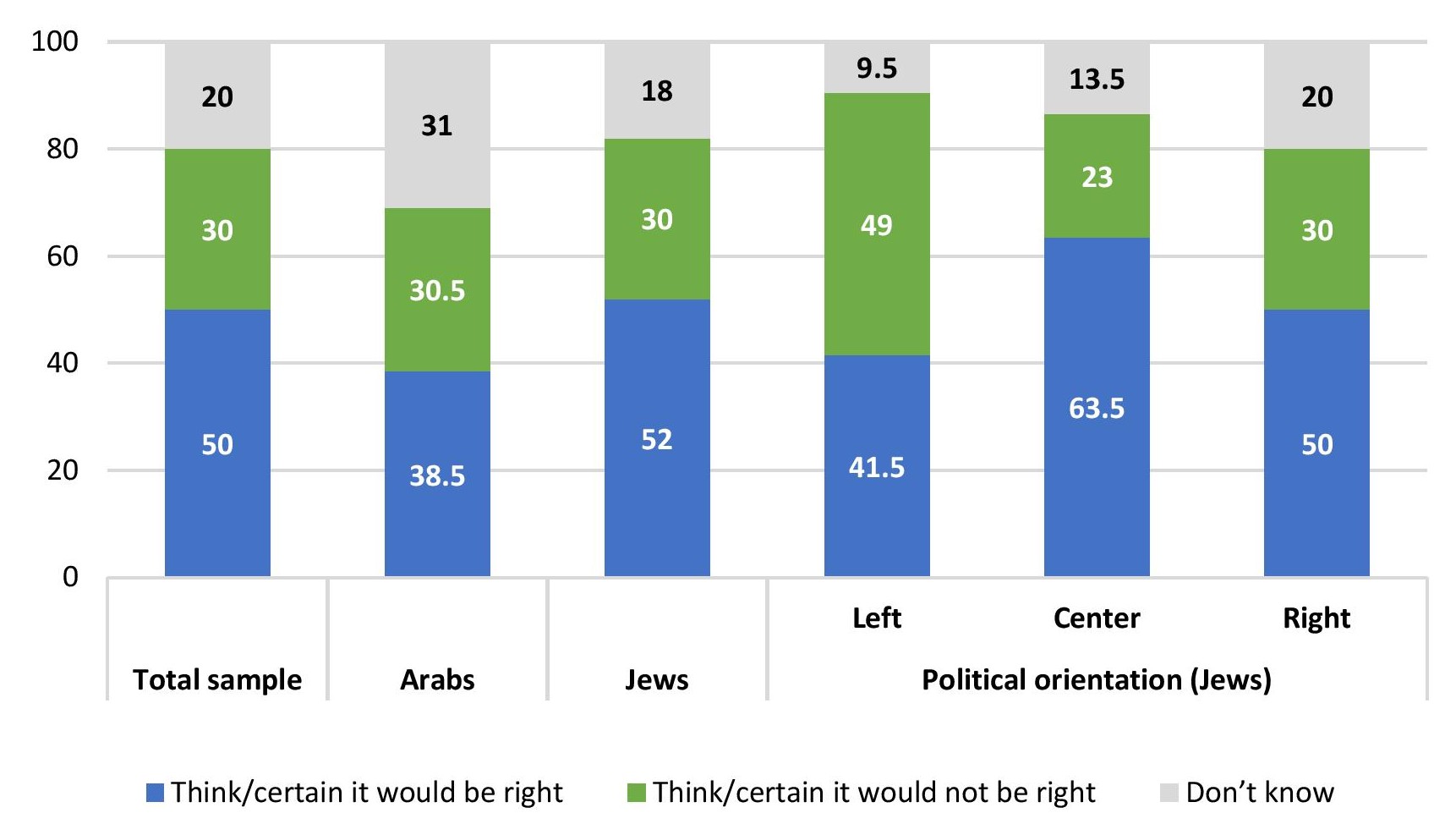
An overwhelming majority of the Jewish public, and a large majority of the Arab public, find the instructions being issued by the IDF Home Front Command clear.
Are the instructions being issued to the public by the IDF Home Front Command at the current time clear or not clear? (%)
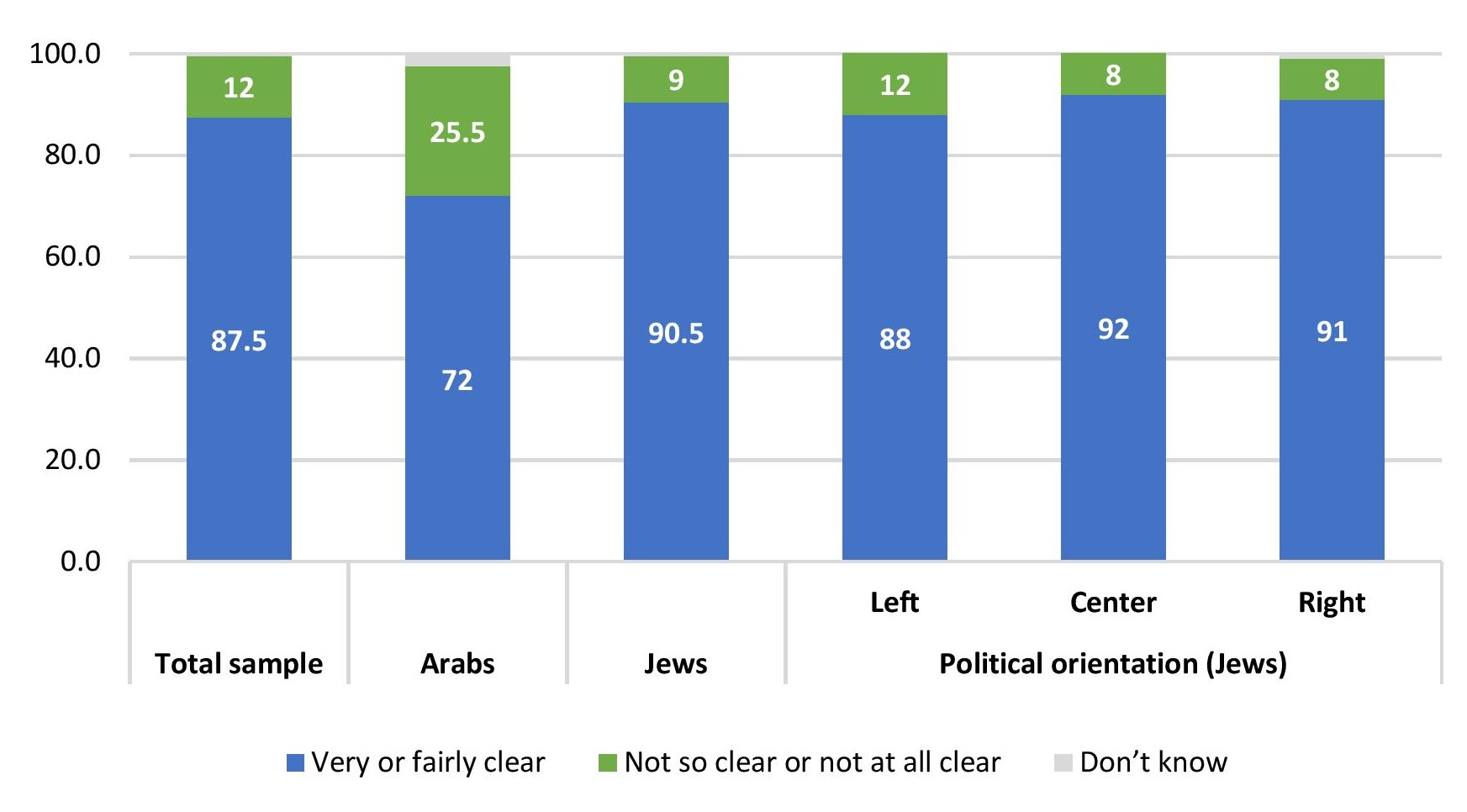
Among both Jews and Arabs, close to two-thirds think that the war will end within a month or less. On the Right and in the Center, around two-thirds think that the war will not last longer than a month, compared with only around half of those on the Left.
In your opinion, how long will the war with Iran last? (%)
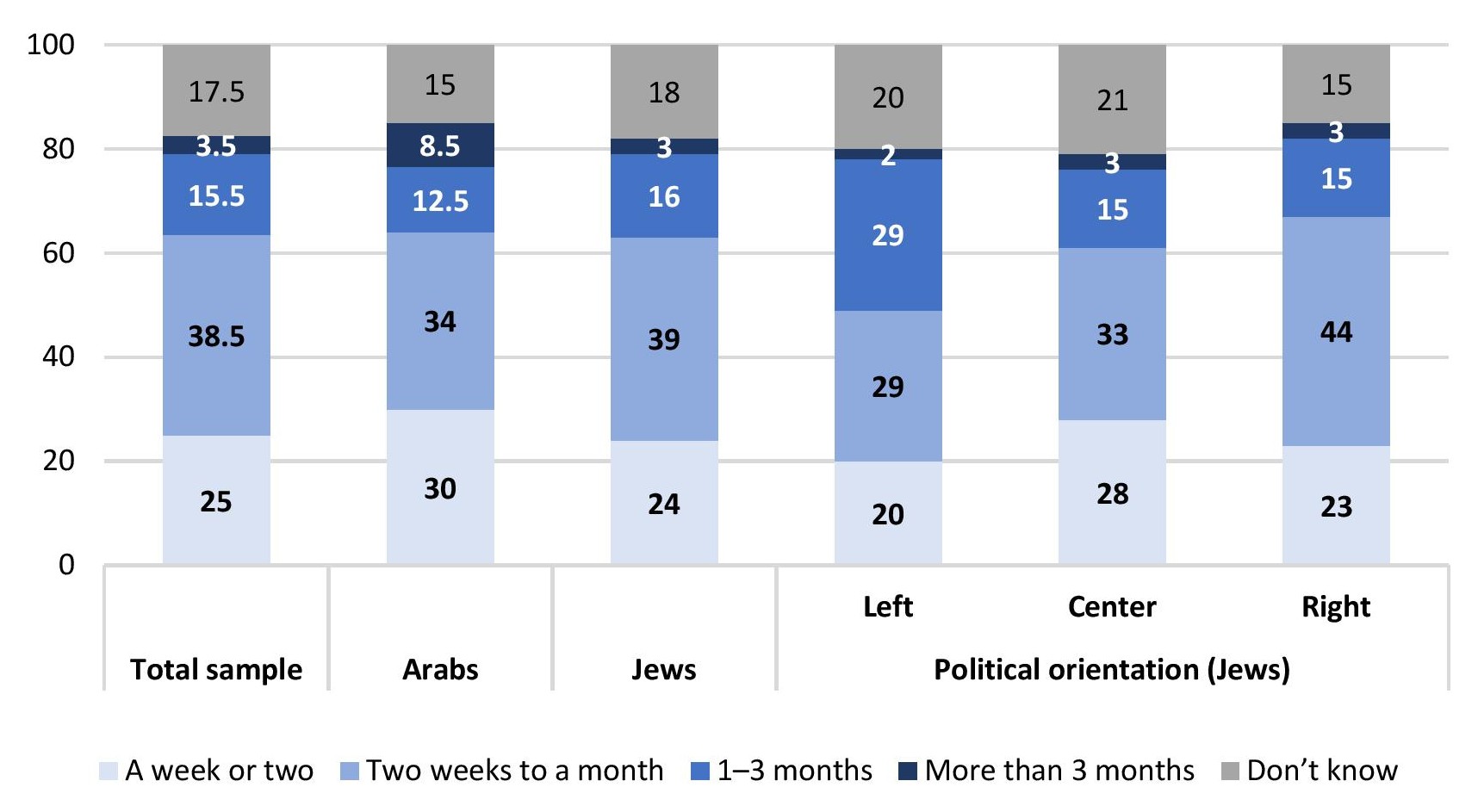
A large majority of the Jewish public thinks that the suffering of Iranian civilians should not be taken into account. On the Left, however, only a minority holds this opinion, while the majority believe that it should be taken into account. The results here are almost identical to a question in this regard about the Palestinian suffering of last month.
By contrast, the majority of Arabs think that the suffering of the Iranian population should be taken into account.
To what extent should Israel take into account the suffering of the Iranian civilian population when planning military operations there? (%)
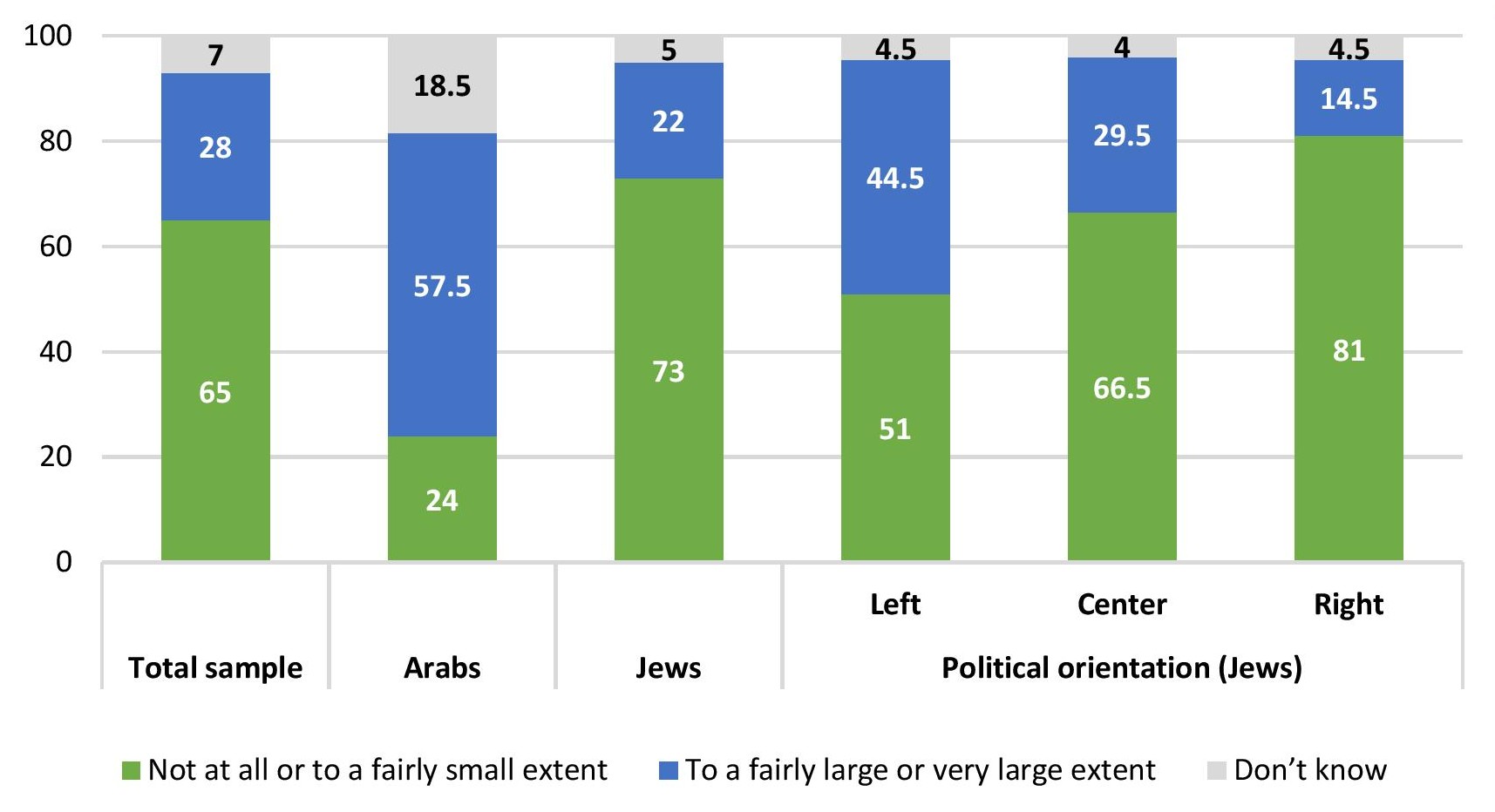
This flash survey on the Iran War ("Rising Lion") was prepared by the Viterbi Family Center for Public Opinion and Policy Research at the Israel Democracy Institute. The survey was conducted via the internet between June 15–17, 2025, with 594 men and women interviewed in Hebrew and 143 in Arabic, constituting a nationally representative sample of the adult population in Israel aged 18 and over. The maximum sampling error was ±3.61% at a confidence level of 95%. Field work was carried out by iPanel. The full data file can be found at: https://dataisrael.idi.org.il.
